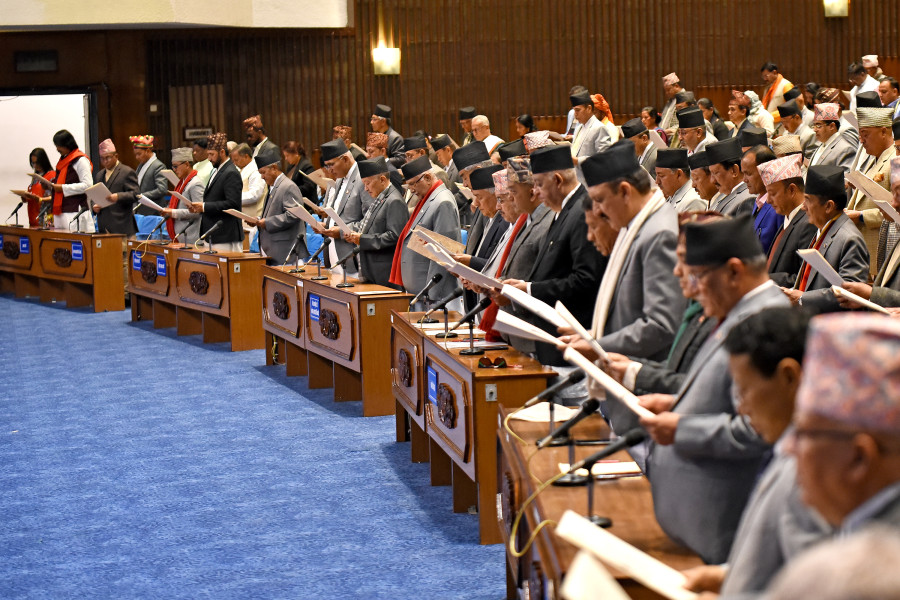Columns
Towards political stability
The strength of the House of Representatives should be reduced from 275 to 165 members.
Khim Lal Devkota
The formal implementation of federalism, adopted in 2015, took place only after the general election in 2017. There have been several reforms after the implementation of this system, mainly the presence of the government at people’s doorsteps. Local government (LG) elections had not been held for about 20 years due to the Maoist insurgency and various other factors. The Principle of Subsidiarity is now in practice.
Nepal has adopted federalism after experimenting with various government systems, each of which has positive and negative features. Federalism has its shortcomings as well. This article focuses on the reforms to be made in political aspects. This is also a matter related to the political stability of the country.
It is necessary to start reforming the system from the head of state (President). As per the Constitution of Nepal 2015, the role of the President is ceremonial, without discretionary powers. But our presidents, after the promulgation of the constitution, have curtailed the rights of the executive head and Parliament. President Bidya Devi Bhandari did not certify the Citizenship Bill, which was approved by the Federal Parliament twice. The merits of the bill are a different matter altogether. But it is the president’s constitutional duty to certify the bill approved by Parliament. The constitution says it should be certified within 15 days. If the ceremonial president had not played with the constitution, the presidential election would not be complicated now. It is important to keep a strict provision in the constitution regarding the president. A provision should be made that the president cannot do anything at her/his own discretion.
There should also be a constitutional provision disallowing an individual from becoming prime minister more than twice. In terms of the president, there is a clause that he/she should not be repeated more than twice. Political party leaders are reluctant to hand over the leadership of the party due to their greed to become the prime minister again and again. Most of the political party leaders in contemporary Nepal have been at the top for decades. If the limit of the prime minister’s position is fixed, it is possible for the leadership of the party to be transferred to the young leaders as well.
The constitution has a provision limiting mayors and LG chairpersons to two terms. It is necessary to have such an arrangement for members of Parliament (MPs). There should not be a situation where some leaders get opportunities repeatedly while others are left behind. It is important to ensure that a person who has become an MP twice successively does not get a third chance. Political leaders should not be stopped completely. They could be given an opportunity after the third tenure break. Otherwise, they will attempt to destroy the constitution. They try to overthrow the democratic system as well.
It is also crucial to change the electoral system, including the numbers. The strength of the House of Representatives (HoR) should be reduced from 275 to 165. The proportional electoral system should be abolished. Issues of inclusiveness should be included in the first past the post-electoral system.
For this, constituencies should be determined on a rotational basis by determining the number of seats for women-women, Dalit-Dalit, etc., to other disadvantaged and marginalised sections. It is necessary to follow the same tools as the HoR in the provincial assemblies. This reduces the number of provincial assemblies from 550 to 330 only. The reduction in the strength of HoR and the provincial assembly will bring great relief to the government system, which is said to have become expensive.
There is another tool to make Parliament more useful. Those elected from the proportional electoral system in the HoR need to move to the National Assembly (NA). In such a situation, the 165-member HoR should be based on a first-past-the-post electoral basis and 110-member NA in the proportional electoral system. But the procedure of electing the members of the NA from the provincial assembly and local-level representatives should be kept as it is. Both the methods discussed here will establish political stability in the country. Due to the mixed electoral system, no matter how popular a certain party is, it will not gain a majority in the HoR. Therefore, under any condition, reforming the electoral system is an urgent need of the country.
Improvements in the number of parliamentarians and the electoral system will help improve the federal system adopted by Nepal. There should be just 15 ministers at the federal level and 10 percent of the provincial assembly members in the provinces.
There is widespread abuse of the ordinance-related constitutional system. Although there is a constitutional provision to issue laws through ordinances if urgent laws are necessary for the country in the absence of a parliament session, in some cases, the government has misused ordinances to fulfil vested party interests. The appointment of members of the Constitutional Council and the division of political parties are some examples. It is important to remove the constitutional provisions related to ordinances in a situation where the system of bringing ordinances with bad intentions is starting to develop.
When the then Prime Minister KP Sharma Oli dissolved Parliament for the second time, the budget speech was just a week away. But the government presented a budget through the ordinance. But even though the permanent house is the NA, the government bypassed it and brought the budget through the ordinance. If there were no ordinance-related provision, the government would have presented the budget in the NA.
To simplify this governance system, it is also necessary to have a provision that the NA will do the work of the HoR in the absence of the HoR. If such a provision were written in the constitution, the 27 bills that became inactive due to the expiration of the term of the HoR would not have fallen to zero. Twenty-two bills are pending in the HoR, and five bills approved and sent by the NA became inactive because the term of the HoR ended. The bills will never be inactive. The accountability and responsibility of the government towards Parliament will also increase. Through the multiplier channel, there will also be improvements in the overall service delivery provision as well.
The role of the district coordination committees has not been effective. Although the constitution gives it the role of monitoring and coordination, the committees have failed to be effective due to a lack of financial resources and working staff. When the officials of this committee are themselves questioning its justification, it is better to cancel this provision altogether. It also helps the governance system’s credibility, thereby relieving federalism of its burden.
Many other parts of the governance system need to be reviewed and improved. For instance, the constitution has given the right of state power to the sub-national levels but ignores the matter of state power. Even the rights related to the police force included in the exclusive list in the constitution have not been transferred to the provinces. The federal government has intervened in the jurisdiction of the sub-national levels. Important laws, including civil service, have not been enacted yet. In fact, the sub-national levels have not been able to feel the sense of being governments.
It is only when such changes are made that political stability is possible. For this, it is important to get the attention of all concerned bodies, including political parties. But are the political actors serious about reforming the core political issues, including the electoral system?




 20.53°C Kathmandu
20.53°C Kathmandu















